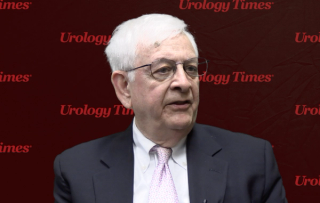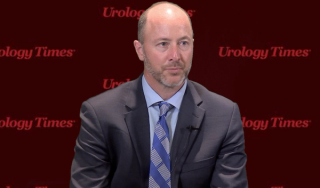
Prostate Cancer
Latest News
Latest Videos

CME Content
More News

Treatment with radiotherapy plus androgen deprivation therapy may improve survival for select patients who are found to have pathologic node-positive prostate cancer at radical prostatectomy

Robot-assisted radical prostatectomy was associated with earlier and increased rate of recovery of erectile function when compared to radical retropubic prostatectomy and a slightly higher but acceptable rate of positive surgical margins, according to a study published online in European Urology (Sept. 4, 2017).

Results of a study examining receipt of definitive therapy for intermediate/high-risk localized prostate cancer provide further evidence of racial disparity in prostate cancer favoring Caucasian men over African-American men.

One gentle “nudge” may be all it takes to start reducing the number of unnecessary bone scans ordered for asymptomatic men with low-risk prostate cancer, results of a recent quality improvement intervention suggest.

Magnetic resonance imaging (MRI) of the prostate may be used in many clinical scenarios, including primary screening, active surveillance, and in patients with a previous negative biopsy and rising PSA. In this interview, Scott Eggener, MD, explains whether MRI is warranted in each of these situations and the benefits and challenges this technology presents.

Information from magnetic resonance imaging and systematic biopsy may be used to identify candidates for partial gland ablation among men with recurrent localized prostate cancer after radiation therapy, researchers from Memorial Sloan Kettering Cancer Center reported at the AUA annual meeting in Boston.

Early follow-up of men with localized prostate cancer treated with novel technology that integrates fusion biopsy findings to guide high-intensity focused ultrasound (HIFU [Focal One]) shows the technique has promise for minimizing post-treatment morbidity while providing good cancer control, Italian researchers reported at the AUA annual meeting in Boston.

A recent review of two phase III randomized controlled trials demonstrated that addition of androgen deprivation therapy to salvage pelvic radiation therapy for prostate cancer recurrence after radical prostatectomy reduces the risk of metastases and improves overall survival.

The development of a model for identifying prostate cancer patients who may be appropriate candidates for hemi-ablative focal therapy remains a work in progress for researchers at Memorial Sloan Kettering Cancer Center.

The following letter was sent to Urology Times in response to a previously published letter to the editor, "Dear USPSTF: Don't discount value of PSA in men 70+."

Other pipeline developments include an agent to control pain in IC/BPS patients, an antibody to treat prostate and bladder cancer, an injectable OAB treatment, and more.

In this interview, Leonard G. Gomella, MD, provides an update on prostate cancer genetics, discusses the recent Prostate Cancer International Consensus Conference, and outlines why urologists should conduct more extensive family histories of their prostate cancer patients.


Despite technological advances in treatment for localized prostate cancer, men continue to experience clinically meaningful side effects that affect quality of life, according to an examination of data from a prospective population-based cohort study.

Metformin may act synergistically with androgen deprivation therapy to improve outcomes for men with advanced prostate cancer, according to findings of an observational study presented at the AUA annual meeting in Boston.

Taller men and those with greater adiposity are at increased risk of having high-grade prostate cancer and of dying from their malignancy, according to recently published research.

The study of men with prostate cancer also found that the majority of the men with a germline cancer predisposition gene mutation did not meet existing criteria for clinical genetic testing.

Other products discussed include cancer tests, an app to connect patients with specialists, a revenue management system, and more

Transrectal saturation biopsy resulted in higher rates of disease reclassification compared with magnetic resonance (MR) fusion biopsy plus extended sextant prostate biopsy in patients with low-risk prostate cancer on active surveillance.

Patients newly diagnosed with prostate cancer show race-related differences in what men perceive as important factors in their treatment decision-making process.

Findings from the ProtecT trial, the European Randomized study of Screening for Prostate Cancer, and PIVOT were among the other noteworthy studies in prostate cancer presented at the AUA annual meeting.

Other pipeline developments include a new company formed to develop OAB treatments, a phase III urothelial cancer study meeting its primary endpoint, the formation of a partnership to study RCC treatment, and more.

Findings from a recent study also suggest that obesity may be a factor to consider for men with prostate cancer deciding between active surveillance and definitive treatment.

Men who experience a prostate biopsy-related complication are more likely to seek active treatment for clinically localized prostate cancer than those who do not experience a complication, according to findings from a review of the Surveillance, Epidemiology, and End Results Medicare linked database.

Results of a retrospective case-cohort study show no significant differences in surgical outcomes among men who did and did not have preoperative magnetic resonance imaging of the prostate prior to radical prostatectomy for prostate cancer.









